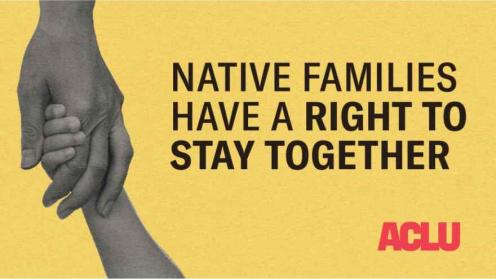
Understanding The Indian Child Welfare Act (ICWA)
Karyna SItkowski
The Indian Child Welfare Act (ICWA) aims to protect rights of Indian children and prevent breakups and separation of Indian families. In 1978, the US Congress passed the legislation of the Indian Child Welfare Act (ICWA) due to the state and private agencies removing 25% -35% of Indian children from their families and placed in non-Indian foster or adoption homes1. These decisions were a result of cultural ignorance, lack of understanding, and biases from the US government. Congress began to see the negative impacts of these decisions and created ICWA to protect Indian children and do their best to place the children within members of the child’s extended family, Tribal communities, foster homes approved by the child’s specific Tribe, or institutions and organizations approved by the Tribe. ICWA allows Indian families and Tribes to receive notice of the court proceedings to allow them to participate in the protection of the child’s rights. The court must currently perform an extensive search for placements of Indian children before they are placed in non-Indian environments. However, Indian children are four times more likely to be removed from their homes and communities than other children2. Even though ICWA is in place, Indian children have higher percentages in the foster care system than in the US population3. The actual population of Indian children within the system is much higher due to assumptions that a child may not be Indian based off their skin tone or name. But what ultimately is behind the disproportionate number of Indian children in the foster care system? A possible explanation could be systemic bias within the child welfare system. Many workers within the child welfare system are not educated on Native culture or struggles that the community faces. There is lack of training of cross-cultural work and policy barriers. Workers may also hold implicit and unconscious biases against Indian children and families. Because of these reasons, cases of Indian children may be overlooked. Most cases of removal of Indian children are due to abuse, neglect or substance use within the home4. Mental health and substance use are much higher within the Indian community which heightens the possibility of abuse and neglect that results in foster care placement5. Ultimately, ICWA offers a way of healing through challenging systemic biases and historical trauma through Tribal sovereignty and self-determination of over the child welfare system. You can educate yourself more on ICWA by visiting https://www.bia.gov/bia/ois/dhs/icwa
For more information about ICWA or Native questions, please
- Frequently Asked Questions Bureau of Indian Affairs https://www.bia.gov/sites/default/files/dup/assets/bia/ois/raca/pdf/idc1-034295.pdf
- National Indian Child Welfare Association https://www.nicwa.org/about-icwa/
3,4,5. Disproportionately in Child Welfare Fact Sheet
https://www.nicwa.org/wp-content/uploads/2021/12/NICWA_11_2021-Disproportionality-Fact-Sheet.pdf
